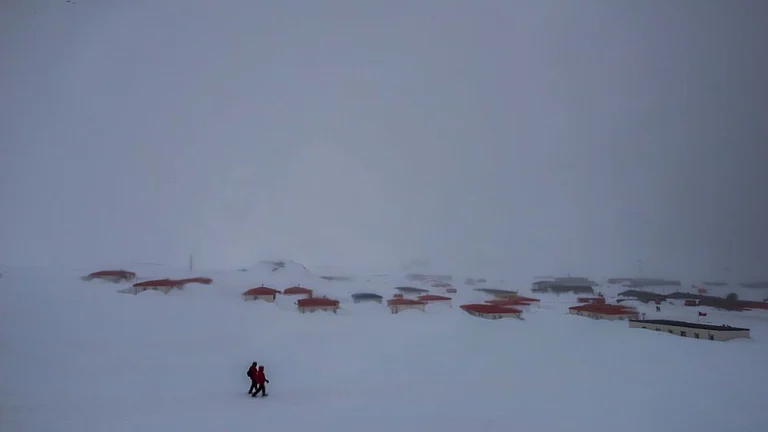Accelerated Antarctic sea-ice decline may have surpassed natural variability, triggering a climate tipping point with widespread consequences.
Scientists warn disruptions in ocean circulation and heat absorption may now be self-reinforcing, even if carbon emissions slow.
Impacts extend to wildlife like emperor penguins and krill, undermining ocean-based carbon storage and boosting planetary heating.
Rising Sea Ice Loss in Antarctica Signals Climate Tipping Point, Scientists Warn of Irreversible Global Impacts
Catastrophic Antarctic sea-ice loss may have triggered a climate tipping point, with irreversible global effects on oceans, weather, sea levels and ecosystems
Rapid loss of Antarctic sea ice could be a tipping point for the global climate, leading to sea level rises, changes to ocean currents and loss of marine life that often have irreversible impacts, revealed a study published in the journal Nature on August 21.
The paper in the journal Nature aimed to describe in previously unseen detail the interlocking effects of global warming on the Antarctic, the frozen continent at the planet's South Pole.
"Evidence is emerging for rapid, interacting and sometimes self-perpetuating changes in the Antarctic environment," it said.
The study gathered data from observations, ice cores, and ship logbooks to capture and analyse long-term changes in the area of sea ice, putting into context a rapid decline in recent years.
"A regime shift has reduced Antarctic sea-ice extent far below its natural variability of past centuries, and in some respects is more abrupt, non-linear and potentially irreversible than Arctic sea-ice loss," it said, referring to melting at the North Pole.
Changes are having knock-on effects across the ecosystem that in some cases amplify one another, said Nerilie Abram, the study's lead author told Reuters.
The study further revealed that a smaller ice sheet reflects less solar radiation, meaning the planet absorbs more warmth, and will probably accelerate a weakening of the Antarctic Overturning Circulation, an ocean-spanning current that distributes heat and nutrients and regulates weather.
Loss of ice is damaging wildlife that depend on Antarctic sea ice including emperor penguins, who breed on the ice, and krill, which feed below it.
Why Scientists are Concerned?
The study reflects polar scientists’ warnings. According to The Guardian, the year 2023 recorded a staggering 2.5 million sq km of Antarctic sea-ice loss, a five-sigma anomaly, and indicating emergent tipping points. Warming oceans, ice shelf collapse, and weakened overturning currents may drive irreversible shifts across the Antarctic system.
The Arctic sea-ice, Geographic Information System, Atlantic thermohaline circulation (THC), and boreal forest have previously been identified as potential ‘tipping elements’ in the Earth system. These are climate subsystems that could exhibit a ‘tipping point’ where a small change in forcing (in particular, global temperature change) causes a qualitative change in their future state. The resulting transition may be either abrupt or irreversible or, in the worst cases, both, according to a study published in the US National Library of Medicine.

